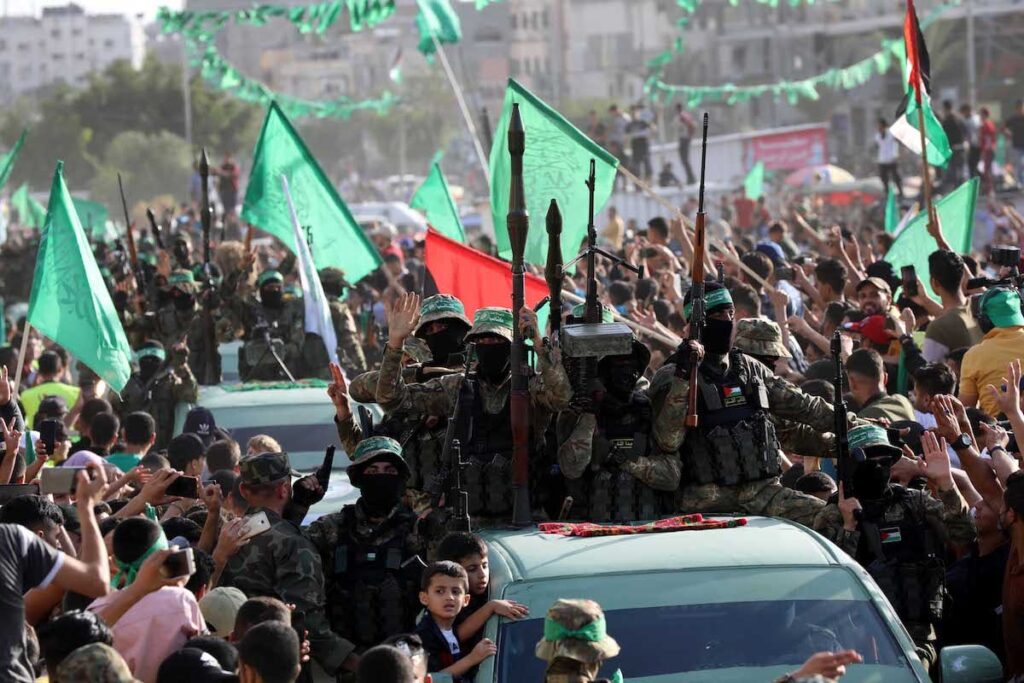
Some Arab media outlets publish articles equating Hamas with Israel. In fact, some of these texts make you feel as if Hamas is Israel and that Israel is the righteous party.
If we examine what’s written by Arab writers and supported by Arab regimes, whose agendas are open normalisation, we will find that many of the writings are simplistic, with superficial inclinations, unaware of the nature of the situation in Palestine or Gaza, or of the nature of the confrontation with Zionism. These writers have the freedom to write, of course, but they live in a world created by their imagination, completely isolated from the situation on the ground in the Palestinian, Arab and international reality.
Simplifying the history of the conflict with Zionism and making it superficial can turn, intentionally or unintentionally, into service to Zionism. The racism that characterises the speeches and language of Benjamin Netanyahu and Israel’s leaders is what characterises some Arab writers today. They are certainly free to write, but deception in presenting the enemy’s rhetoric will not help because it will soon be exposed. Take, for example, how recent events around Al-Aqsa, Gaza and the rest of Palestine have exposed the fragility of the enemy’s rhetoric and status. In some cases, I advise the reader to do an experiment: to erase the name of the Arab writer and the Arabic newspaper in which the article was written, and then read the article impartially. You will find that what you’re reading is identical to the statements of the Israeli right-wing. Certainly, there is something wrong when you find that expressions written by Arab writers about the resistance and Hamas are equal and identical with those issued by Israel and the Israeli right-wing. This raises a lot of questions, to say the least.
Adopting the rhetoric of the enemy is not new. In Vietnam, at the height of its liberation, and in Algeria, at the height of its battle, voices that were closer to the voice of the enemy have always emerged. These voices focused on reducing people’s confidence in themselves and in the causes for which they fought. These attitudes reflect a view that despises the masses and their rights and glorifies power, identification with the West and authoritarian colonialism. Frantz Fanon wrote a valuable book that has become a classic in the analysis of this phenomenon – Black Skin, White Masks. If we use the same analogy with the Arab situation, we will find Arab skin dipped in Israeli masks.
This school of thought identifies with Israel and Israeli technology and science, but it overlooks Israeli racism, ethnic cleansing and apartheid prevailing in its laws and structure. It even overlooks the injustice that Israel spreads, blaming Arabs and Palestinians for the occupation and settlement. Striving to reverse historical and current facts will not succeed in fooling the Arab nation and its people.
Hamas is a political and liberation movement that emerged in 1988, during the second Intifada. It has evolved and changed over time, to become the expression of the methodology of armed struggle in the Palestinian arena. The armed struggle methodology did not come from nothing, but was the result of the daily Israeli violence against the Palestinian people, which has been ongoing since the Nakba of 1948. Al-Qassam Brigades represents a national military force for Palestine, and its youth are historical fighters. The young men who joined Al-Qassam Brigades joined because of its ability to inflict pain on the enemy, and not because of the Islamist ideology of Hamas.
Demonising Hamas, which aims to obliterate its positives and magnify its mistakes, is an intentional act stemming from the Israeli intelligence and foreign services. Thus, it is not by chance that some Arabs who widely believe in normalisation would adopt the same Zionist Israeli visions of demonising Hamas. But this will not work, as Hamas is a resistance group, and it was able in a few weeks during the battle of the “Sword of Jerusalem” to break the demonisation that a group of Arabs worked to create.
Hamas is a product of the Israeli occupation and the Nakba. It suffices to mention that 90 per cent of Gaza’s population are Palestinian refugees, and that Hamas has expressed the refugees’ desire to return to their homeland. In light of the Palestinian Authority’s pursuit of negotiating over lands that are increasingly disappearing, it is only natural for Hamas to fill the void with the aim of resisting the enemy and establishing new balances in the face of Zionism.
The campaign to demonise Hamas is a campaign to portray Israel as a peaceful state, while, in reality, it is a violent, racist and apartheid state that was established through the theft of Palestinian land. The Hebrew University in the heart of West Jerusalem was founded on lands stolen from the Palestinians, and so was the University of Haifa and several other Jewish universities. Abuse has its limits, and Arabs are more aware nowadays. Despite all kinds of demonisation, Egypt has recently realised the necessity of coming to an understanding with Hamas and dealing with it as a resistance movement capable of influencing the balance of powers.
Post Disclaimer
Disclaimer: Hamas and Israel's demonising tools by Shafiq Nazim al-Ghabra - Views expressed by writers in this section are their own and do not necessarily reflect Latheefarook.com point-of-view